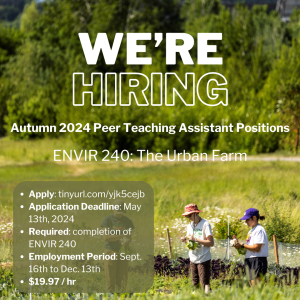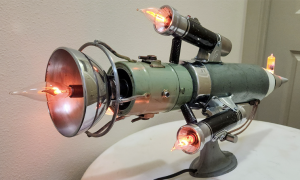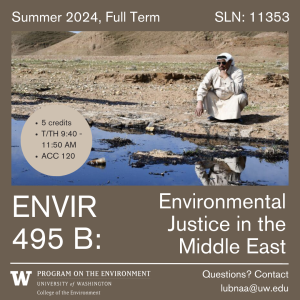 Each year, the College of the Environment asks for nominations of College community members who make exemplary contributions in areas including teaching, mentorship, community impact, and more. This year, we are absolutely thrilled that PoE’s very own P. Sean McDonald has been selected to receive the 2024 College of the Environment Outstanding Teaching Faculty Award.
Each year, the College of the Environment asks for nominations of College community members who make exemplary contributions in areas including teaching, mentorship, community impact, and more. This year, we are absolutely thrilled that PoE’s very own P. Sean McDonald has been selected to receive the 2024 College of the Environment Outstanding Teaching Faculty Award.
This award recognizes a faculty member who embodies the academic mission of the College of the Environment. Someone who is committed to inclusive teaching and mentoring of students, who takes an innovative approach to instruction that deepens student engagement and fosters enthusiastic learning, and who inspires and empowers students to think critically about the ways in which they can each become changemakers in their own right. Sean is a stellar example of these qualities and such a deserving recipient of this award.
Sean has been described as a “visionary thinker and an innovator in the classroom.” He is the fearless leader of the PoE Capstone course series which serves every single Environmental Studies major. Between maintaining relationships with over 80 external organizations and guiding students through what may be their first professional experience, Sean gracefully navigates this juggling act to ensure every student graduates with the tools they need to succeed. Put concisely, “Sean’s thoughtful design of rigorous courses and his kind, empathetic approach empowers students to work harder and to accomplish more than they think possible.”
Capstone is just one of many feathers in Sean’s cap; he has taught a number of other courses during his time with PoE, leading in areas of Environmental Communication and striving to bring together students with the greater Seattle community and beyond. Now more than ever, shepherding the next generation of effective environmental communicators is fundamental in working towards a more sustainable and equitable world. Sean’s commitment to preparing students for this challenge is perhaps one of the clearest examples of his relentless dedication to inspiring scholarly growth.
Please join us in celebrating Sean’s outstanding contributions! As his students and colleagues alike would agree, “Sean is precisely the sort of exemplary teacher this award was created to acknowledge.” His care for students, pedagogical innovation, and unrelenting dedication to this Program, College, and University are truly admirable, and we are excited to see him receive this well-deserved recognition.




 This year’s Trash Art contest, held by UW recycling, has finally come to an end! Students & staff were invited for the fifth year in a row to submit artwork created from items normally thought of as trash, or a written work about waste and sustainability, that conveyed feelings or ideas about waste and sustainability.
This year’s Trash Art contest, held by UW recycling, has finally come to an end! Students & staff were invited for the fifth year in a row to submit artwork created from items normally thought of as trash, or a written work about waste and sustainability, that conveyed feelings or ideas about waste and sustainability.

